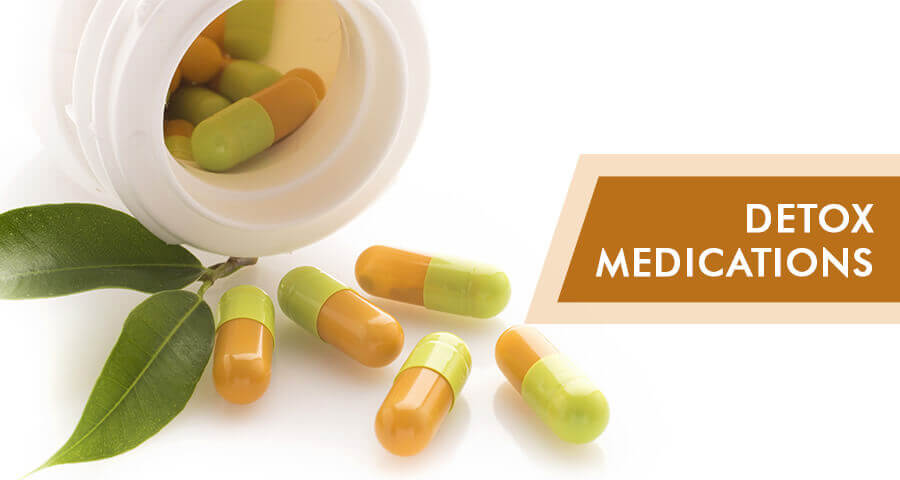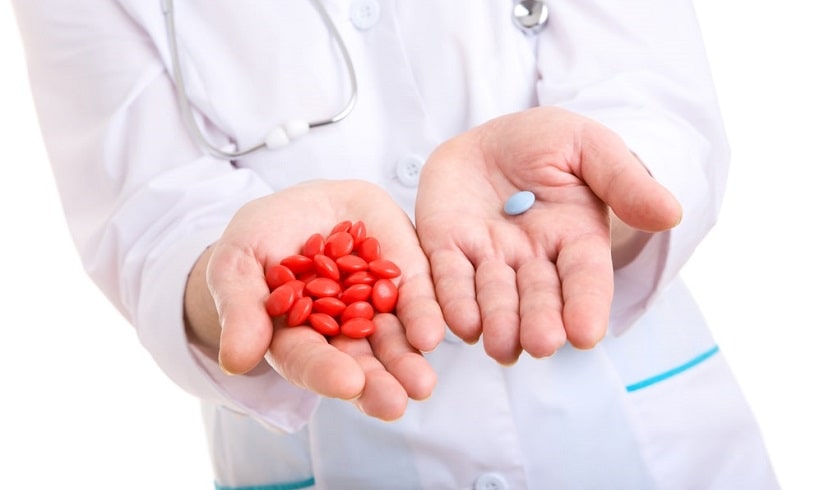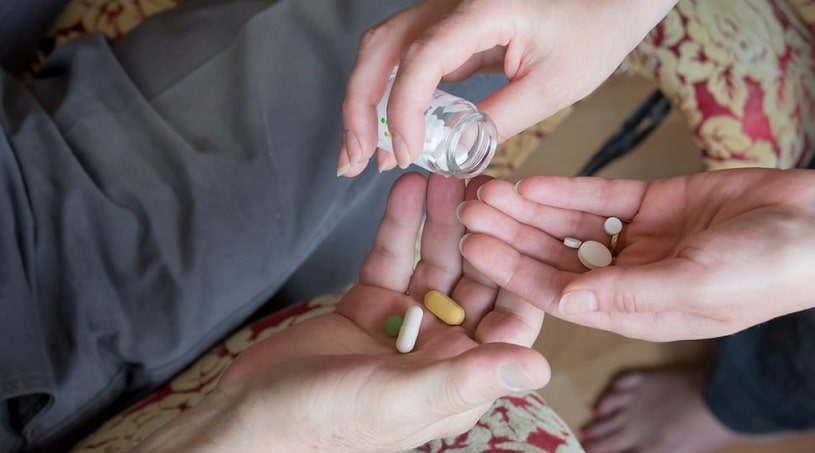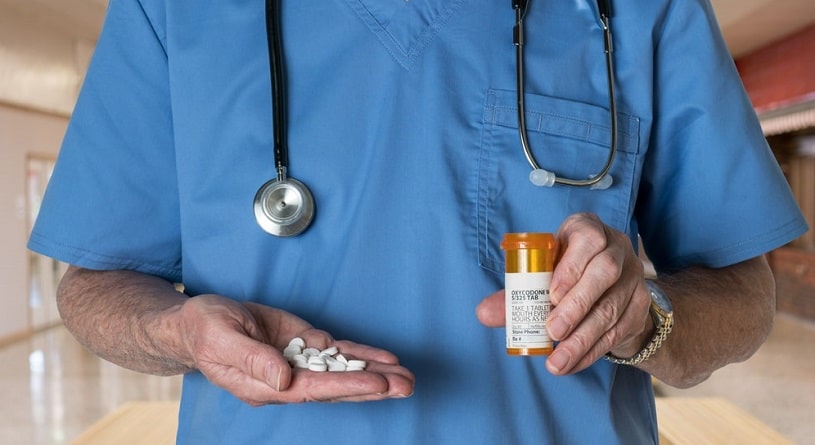
When a person with an addiction decides to quit drinking or using illicit drugs, the first step in substance abuse treatment is usually medical detoxification. This is the process during which harmful chemicals and toxic substances are removed from the body under medical monitoring. Detox medications help to detox from drug use easier. They are prescribed in a supervised medical environment to manage the patient during the detoxification process.
Table Of Contents:
- How Do Detoxification Meds Help?
- What Is Used For Alcohol Addiction?
- What Drugs Are Used For Opioid Detox?
- Which Ones Are Used For Stimulants?
- Do They Make Withdrawal Easier?

Why is medication detox necessary? Illicit drugs are potent substances that create intense physical and psychological dependence. Withdrawal from these substances is associated with many chemical changes in the brain and body of the recovering addict and associated symptoms. Using one or more medications during the process can help make it less uncomfortable. Learn more about medication-assisted detox and its role in substance abuse recovery.
The Role of Meds in Addiction Treatment
When a person with a substance use disorder enters an alcohol or drug rehabilitation program, the first step is often drug detoxification to start the recovery process. Detoxification involves withdrawing the offending substance from the addict’s body in a gradual, controlled manner under the supervision of healthcare professionals. The goal of medication detox is to safely withdraw addicts from a drug and enable them to become drug-free in a dignified manner while preparing them for ongoing treatment.

Not every recovering addict requires detox for drugs. However, certain substances, such as opiates and alcohol usually require detoxification at the beginning of the treatment process. Going through drug detoxification is a difficult task. The brain and body of a recovering addict are used to certain chemicals, the absence of which produces symptoms that can range from nausea and headaches to hallucinations and convulsions.
There is an option of rapid drug detoxification during which medications are administered to a patient under anesthesia. It usually takes several days, unlike typical medical detoxification. However, this approach has several dangerous side effects. Moreover, there are no studies proving it works more effectively and provides the desired results. It is also a bad idea for an addict to quit alcohol or drugs cold turkey without medical supervision.
A medication detox can help offset some severe withdrawal effects and keep them at a more bearable level. The use of one or more detox medications, like buprenorphine for opioids or lorazepam for alcohol withdrawal, can control discomfort and help the addict safely withdraw from drug use. However, unsupervised drug detoxification with a drug detox kit or prescription medication can be fatal. For example, a severe condition known as delirium tremens can sometimes occur during alcohol detoxification and can be life-threatening without proper treatment with medications.
Only a medical professional can decide on detoxification medication prescriptions. Do not try to self-medicate with any of the drugs mentioned to avoid hazardous health consequences. Detox at home may be a dangerous practice.
Medication-Assisted Detox for Alcohol Addiction
Why is medical detox needed? Withdrawal from alcohol can result in many intense, unpleasant symptoms. The severity of the patient’s discomfort varies with the severity and length of the addiction.
Some Common Symptoms That May Occur During Medical Detoxification Include:
- Nausea and vomiting
- Sweating
- Tremors
- Fatigue
- Shakiness and irritability
- Anxiety, depression, panic attacks
- Fever
- Hallucinations or nightmares
- Convulsions
- Delirium tremens (DTs)
What are some of the medications used for detoxification to help alcoholics quit drinking safely and comfortably?
Benzodiazepines
Benzodiazepines are psychoactive drugs that act as safe and effective detox medications. In fact, benzos are the mainstay of treatment for alcohol withdrawal syndrome. A study by PMC shows that benzodiazepines reduce the severity of symptoms and decrease the incidence of seizures and delirium tremens. Benzos relieve alcohol withdrawal symptoms by slowing down the central nervous system. Medications such as Valium and lorazepam for alcohol withdrawal are prescribed during detoxification for their tranquilizing and anticonvulsant effects. Sedation with benzos prevents agitation and reduces the risk of seizures during detoxification.
Benzos are the most valuable medications to treat alcohol withdrawal. They control anxiety as well as seizures. In essence, they help the patients stay calm and peaceful. Additionally, they may also prevent complications.
Benzodiazepines used for alcohol treatment include such medications as Valium, Librium, Oxazepam, Ativan, etc. While all of them belong to the same class, there are some differences in how they act.
Ativan Benefits Compared With Other Benzos:
- It is an intermediate-acting benzo. Interestingly, it does not transform into an active chemical even after some chemical changes inside the body. Because of this, lorazepam for alcohol withdrawal is safe for patients who have liver diseases.
- Next, it has a lower potential to cause sedation and a drop in the breathing rate. This unique property is particularly useful in alcohol withdrawal. It is because respiratory problems are expected during the withdrawal.
- Additionally, it is relatively safe and can produce desirable results with a lower dose. The duration of the therapy is also shorter when they use it. It is according to a 2014 study published in Alcohol and Alcoholism, Oxford Academic.
Anticonvulsants
Anticonvulsants are prescribed as detox meds to reduce the complications of withdrawal from alcohol abuse. Carbamazepine has been shown to alleviate psychological distress, reduce anxiety and aggression, and decrease cravings. Doctors have found that patients treated with valproic acid have less severe symptoms during detoxification and fewer seizures.
Adrenergic Medications
Medications such as clonidine and propranolol may be prescribed along with benzodiazepines during medical drug detoxification for alcohol. These medications treat elevated blood pressure and fast pulse during detoxification. They are sometimes used in patients with less severe symptoms in the outpatient setting when benzodiazepines cannot be prescribed due to a lack of monitoring.
Gabapentin For Alcohol Withdrawal
There are two known effects of gabapentin: it decreases abnormal excitement in the brain in the treatment of seizures and changes the way the body senses pain in the treatment of pain disorders.
Doctors and rehabilitation clinics use gabapentin for alcohol withdrawal and cravings. The medication is helpful in the treatment of alcohol withdrawal symptoms because it addresses the pain and may help manage seizures that can result from detoxing. The exact gabapentin for alcohol withdrawal dosage will depend on the severity of the addiction and if the user is addicted to substances besides alcohol.

Many believe it can also be used to keep those in recovery from relapsing. Several studies have been completed on the use of gabapentin for alcohol withdrawal and dependence, finding those who use the medication over a placebo abstained better, with a rate of 22% in the placebo group to a rate of 44% in the 1,800 mg group when measuring heavy drinking.
While gabapentin helps treat alcohol addiction, long-term use of the medication can lead to addiction too. At the very least, using gabapentin for alcoholism must be accompanied by a comprehensive substance abuse treatment and recovery program.
Other Detox Medications
Several other medications, such as barbiturates, baclofen, and sodium oxybate, are used in medication-assisted detox. Newer drugs, such as ketamine, are used to treat severe alcohol withdrawal symptoms. Dexmedetomidine is a medication that is used during detoxification in the emergency setup.
Medication Detox For Opioids
Opioid drugs include prescription pain-relieving medications such as oxycodone, hydrocodone, codeine, and morphine, as well as street drugs such as heroin. Opiates produce an artificial euphoric effect on the human brain.

Two types of opioid detox medications are available. Agonists are drugs used to wean off opiates because they bind to the receptors in the brain and mimic the effect of opiate drugs. Antagonists are medications that block opioid receptors in the brain and prevent their stimulation.
Opiate detox medications can cause addiction as well. Strictly follow the prescription of the doctor if using such substances. It is always necessary to enroll in inpatient detox in case of opioid abuse, especially when detoxing while pregnant.
It is unsafe to take any medicines without a prescription.
Methadone
Methadone is one of the most commonly prescribed heroin detox medications. It is an opioid agonist that reduces cravings for the drug and relieves withdrawal symptoms in opiate addicts. It does not produce the same high as an opioid drug, but it stays in the body longer and relieves cravings. In addition to its use as a form of medication detox for opiates, it is used for long-term maintenance treatment of opioid addiction. However, prolonged use of methadone can lead to dependence and addiction, which is why this drug is closely monitored through licensed methadone treatment programs.
One study has shown that using gabapentin for opiate withdrawal along with methadone therapy has shown positive results. Gabapentin for opiate withdrawal also had a beneficial effect on symptoms of heroin withdrawal as an add-on medication.
Buprenorphine (Subutex)
Buprenorphine is an opioid partial agonist and one of the opiate detoxification medications used to shorten the length of the process. Numerous studies have proven its effectiveness. Buprenorphine works as a maintenance treatment long-term. It was introduced under the Drug Addiction Treatment Act of 2000 in the U.S, which allows it to be prescribed by any licensed physician. Buprenorphine is now included in the WHO model list of essential drugs. The combined form of buprenorphine with naloxone (Suboxone) helps prevent dependence on a drug.
Naltrexone
Naltrexone is an opioid antagonist medication that prevents neurotransmitter stimulation and blocks the drug’s euphoric effect, thereby, the recovering addict’s ability to get high. Thus, it essentially decreases cravings for the drug and prevents relapse as part of the long-term treatment plan for opioid addiction. Naltrexone is a detox medication prescribed to be taken orally daily or three times a week. It is available under the brand names Depade and ReVia (pill form) or Vivitrol (injectable form). Medication-assisted detox with Naltrexone is prescribed after opioids have been completely flushed out of the system.
Adrenergic Drugs
Clonidine and propranolol are used as detox meds for opiate abuse because they suppress the fight-or-flight response and reduce high blood pressure, agitation, anxiety, muscle aches, cramping, and sweating. Other medications may be prescribed to help with specific problems such as vomiting, diarrhea, or insomnia.
Drugs Used for Detox from Stimulants
Stimulants are psychoactive drugs that increase brain activity and elevate mood, awareness, and alertness. Although stimulants like caffeine are widely used, some stimulant drugs, such as cocaine and methamphetamines, are highly addictive and illegal. Prescription stimulants, including Ritalin, Adderall, and Dexedrine, are also extensively abused. Recovering addicts may need to undergo mediсation-assisted detox for stimulant dependence.
Symptoms During Stimulant Drug Detoxification Can Be Both Physical and Psychological and Include:
- Jitteriness
- Anxiety
- Dehydration
- Chills
- Slowed speech
- Slowed movements
- Dulled senses
- Hallucinations
- Paranoia
- Depression
- Insomnia
- Fatigue
- Body aches
- Impaired memory
- Unpleasant dreams
Suboxone
A gradual taper of stimulant drugs is associated with less severe symptoms. Medicine for detoxification from stimulants makes the stages of detox safe and more bearable. Suboxone is sometimes prescribed when tapering stimulant use in a detoxification center.
Antidepressants
Depression related to withdrawal from a stimulant drug can be very severe, especially in recovering addicts with a history of underlying or pre-existing depression. Antidepressants, such as desipramine may be prescribed as a medicine for detox to help alleviate this symptom.
Sedatives and Tranquilizers
Diazepam is used to manage mild to moderate symptoms during detoxification. In addition, benzodiazepines act as tranquilizers during cocaine and meth detox.
Anticonvulsant Medications
Topamax and Neurontin are useful in the initial stages of stimulant withdrawal to reduce cravings and prevent Adderall crash.
Other Medications
Muscle relaxants such as baclofen reduce cravings. Provigil is a mild stimulant drug prescribed to manage extreme lethargy and sleepiness during stimulant drug detox. Other detox medications may be used for specific symptoms such as nausea or headaches.
Drug Detox Medications: Making Withdrawal Easier
As a recovering addict starts on the path to recovery from addiction, the essential thing is to stop drug or alcohol abuse in a medically supervised setting to avoid severe or even life-threatening symptoms.
Substance abuse treatment with detox meds can take the edge off and help recovering addicts negotiate drug withdrawal safely, efficiently, and more comfortably if used properly and monitored by a doctor. IV detox therapy with amino acids or vitamins is also helpful in reducing the symptoms and making an addict feel better.
There are some effective cures for addictions, but treatment always starts with detoxification. Even the best rehabs in the U.S. believe that detox is the initial and one of the most critical stages of rehabilitation.
Frequently Asked Questions
Does Imodium Help With Opiate Withdrawal?
Loperamide is sometimes used during detoxification and withdrawal to treat diarrhea, stomach cramps, vomiting, and nausea. However, Imodium does not help with symptoms such as cravings, flu-like symptoms, depression, irritability, etc. In addition, loperamide will not grant relief from severe pain, muscle aches, and psychological dependence on the drug abused.
Therefore, Imodium is not considered an effective medication for opioid detox.
Do Detox Medications Work?
Yes, they do. Each detox medication is aimed at a specific withdrawal symptom. By alleviating these symptoms, they make the withdrawal and detox process more accessible and more likely to bring positive outcomes.
Can I Detox With Medications On My Own?
Detoxification from opioids and alcohol can be dangerous and requires medical assistance. Trying to detox at home can lead to severe complications. Moreover, taking the above-mentioned medications without a doctor’s prescription is unsafe and can even be illegal if it is a controlled substance. That is why, no, one cannot detox using these medications independently. Medical assistance is vital in situations concerning drug withdrawal.
Hope Without Commitment
Find the best treatment options. Call our free and confidential helpline
Most private insurances accepted
Find Drug Rehabilitation Centers Near You Anywhere In the US
Addiction Resource team has compiled an extensive list of the top drug rehabilitation facilities around the country. Use our locator tool to find the best centers near you.
Page Sources
- Sachdeva, A., Choudhary, M., & Chandra, M. (2015). Alcohol withdrawal syndrome: benzodiazepines and beyond. Journal of clinical and diagnostic research: JCDR, 9(9), VE01. https://www.ncbi.nlm.nih.gov/pmc/articles/PMC4606320/
- Mason, B. J., Quello, S., Goodell, V., Shadan, F., Kyle, M., & Begovic, A. (2014). Gabapentin treatment for alcohol dependence: a randomized clinical trial. JAMA internal medicine, 174(1), 70-77. https://www.ncbi.nlm.nih.gov/pmc/articles/PMC3920987/
- Carrieri, M. P., Amass, L., Lucas, G. M., Vlahov, D., Wodak, A., & Woody, G. E. (2006). Buprenorphine use: the international experience. Clinical Infectious Diseases, 43(Supplement_4), S197-S215. https://academic.oup.com/cid/article/43/Supplement_4/S197/281700
- Salehi, M., Kheirabadi, G. R., Maracy, M. R., & Ranjkesh, M. (2011). Importance of gabapentin dose in treatment of opioid withdrawal. Journal of clinical psychopharmacology, 31(5), 593-596. https://pubmed.ncbi.nlm.nih.gov/21869694/
- Martınez-Raga, J., Sabater, A., Perez-Galvez, B., Castellano, M., & Cervera, G. (2004). Add-on gabapentin in the treatment of opiate withdrawal. Progress in Neuro-Psychopharmacology and Biological Psychiatry, 28(3), 599-601. https://www.sciencedirect.com/science/article/abs/pii/S0278584603003257
- Shulman, M., Wai, J. M., & Nunes, E. V. (2019). Buprenorphine treatment for opioid use disorder: an overview. CNS drugs, 1-14. https://www.ncbi.nlm.nih.gov/pmc/articles/PMC6585403/


 Reviewed by:
Reviewed by:  Written by:
Written by: 
 FindTreatment.gov
FindTreatment.gov